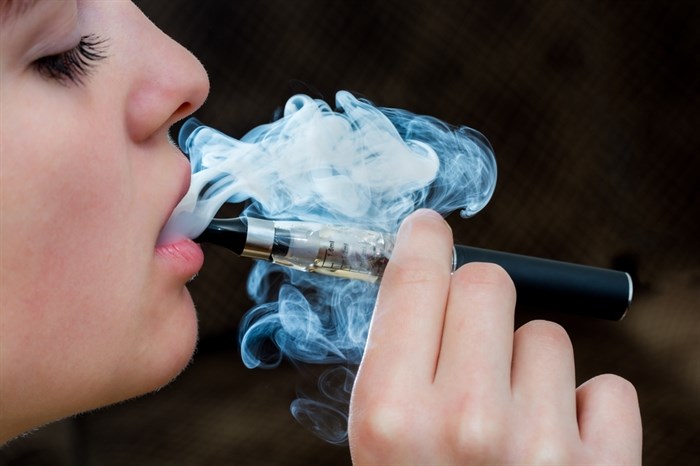
Image Credit: Shutterstock
October 17, 2019 - 6:30 PM
When surveys were conducted within the schools of the Kamloops-Thompson School District to find out what students wanted to know about vaping, school board and TRU representatives found some commonalities in the answers they received.
Allison Innes-Wiens has spent several years working in hospitals, emergency departments and intensive care units as a s a registered respiratory therapist and is now a lecturer with the respiratory therapy program at Thompson Rivers University.
She’s teamed up with representatives from School District 73, several students from the respiratory therapy program and the faculty of nursing to make a presentation geared towards providing youth with information on vaping.
According to the Kamloops-Thompson school district the number one answer as to why vaping is so appealing to teenagers was peer pressure.
“I think it’s less that kids are being pressured into doing it and more kids feeling pressure if they don’t vape, they don’t fit in,” Innes-Wiens says. “It’s incredibly alarming.”
Students also wanted to know what is in the vaping liquid and short term and long term health effects.
“We are still in the phase where we are collecting research, data and information and we are trying to make a presentation that will hopefully be able to be modified for different age levels,” Innes-Wiens says. “We are trying to create an evidence-based presentation but not throw a bunch of science and articles at them but just have the facts.”
The goal is to target kids as young as Grade 6 to Grade 12 with the presentation.
So far, Innes-Wiens says there is limited information out there on vaping making it somewhat challenging.
“(Vapes) just haven’t been on the market long enough, I mean, the modern vape was introduced in 2003 and it was only legal in Canada with the nicotine vape since 2018,” she says. “There is not a lot of studies out there on the health impacts but we have looked at some initial studies in mice where… they basically make mice vape and it has shown inflammation in the mice and it’s also shown some early cancer cells as well.”
However this research is hard to relate to humans, Innes-Wiens says.
"We are just seeing in the case reports of people who use vapes, they are having health effects of shortness of breath, coughing, throat irritation and things like that,” she says.
And the problem researchers have run into is trying to pinpoint the exact ingredient that is causing those issues.
“One of the big troubles with the vapes is that there are so many different ingredients,” she says. “It’s really hard looking at the studies to isolate what is actually causing the irritation or what the long term (effect) of each of these ingredients are because there are so many different flavours.”
The presentation also hopes to change the perception that vaping is completely harmless, Innes-Wiens says.
“A lot of kids and teenagers they know that smoking is bad but there are some that choose to do it anyway, that message has been driven home that smoking is bad and here are the long term effects,” she says. “I think people think vaping is potentially safe or harmless so I really just want to make sure when kids are offered these things that they have all the information that is available so far.”
Part of the presentation will also include addressing the liquid in vapes.
“People seem to think that it’s just water vapour but when you look at the components of what is in the e-juice it has to have a carrier liquid and that’s propylene glycol or vegetable glycerin… so it’s not an oil but it’s like a syrupy kind of liquid and if you imagine heating that and inhaling that, it’s not water vapour, it’s not benign and it’s not harmless,” she says.
Innes-Wiens says the topic of nicotine will also be addressed as well in the presentation but the intention isn’t to change anyone’s habits.
“We want to present these things in a way that is factual, we are not trying to scare them,” she says. “We are just saying this is what we know, this is what we don’t know and think about what you’re putting in your body, the long term effects and you may be fine doing it now but what is it going to do to your lungs 20 years down the road and do you really want to be taking that chance,” she says.
The presentation will be delivered in schools starting in November. For schools outside the region, they plan on making it available to principals and teachers in rural communities so they have access to it as well.
“We don’t want to come from a fear-mongering perspective and say if you vape you’ll die tomorrow because we don’t know that. We know it’s not good for you but we don’t have the long term studies to prove certain things,” she says. “We want to say ‘here are the facts, this is what we know and we want the kids to take that information.”
—This story was updated at 3:26 p.m. on Monday, Oct. 21 to clarify the surveys within the schools were conducted by representatives from School District 73 and TRU.
To contact a reporter for this story, email Karen Edwards or call (250) 819-3723 or email the editor. You can also submit photos, videos or news tips to the newsroom and be entered to win a monthly prize draw.
We welcome your comments and opinions on our stories but play nice. We won't censor or delete comments unless they contain off-topic statements or links, unnecessary vulgarity, false facts, spam or obviously fake profiles. If you have any concerns about what you see in comments, email the editor in the link above.
News from © iNFOnews, 2019